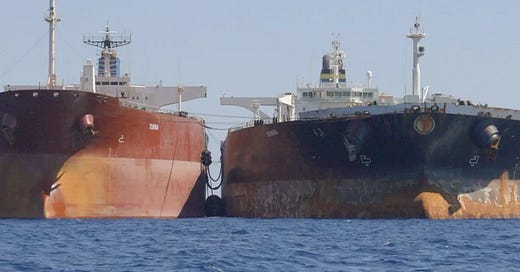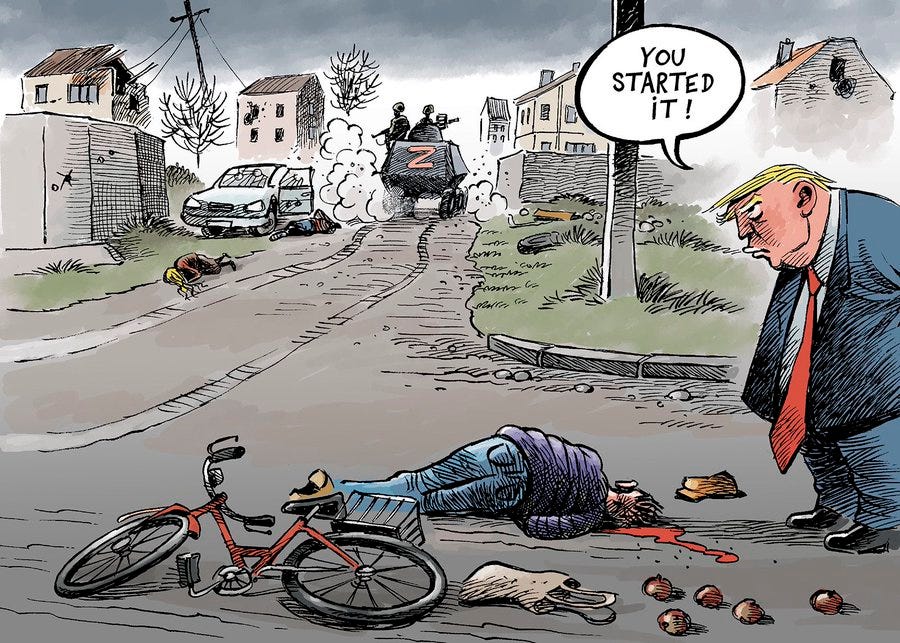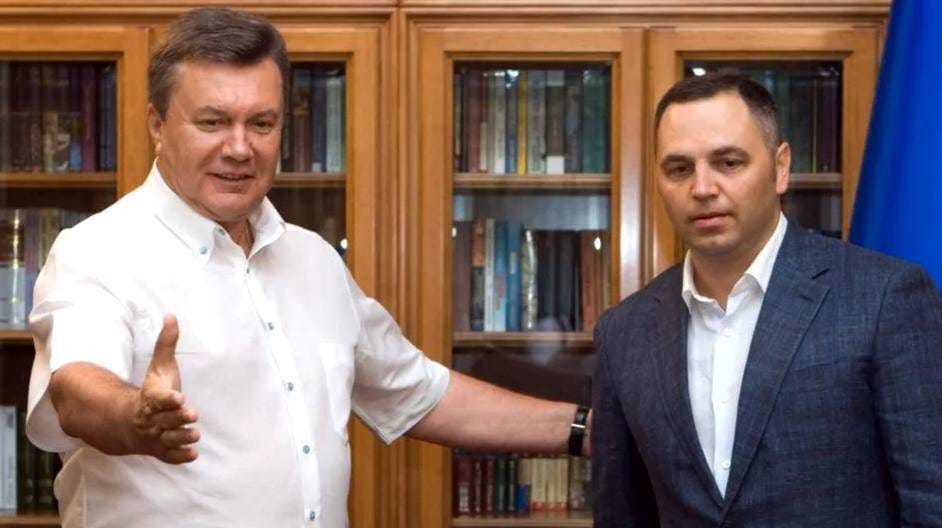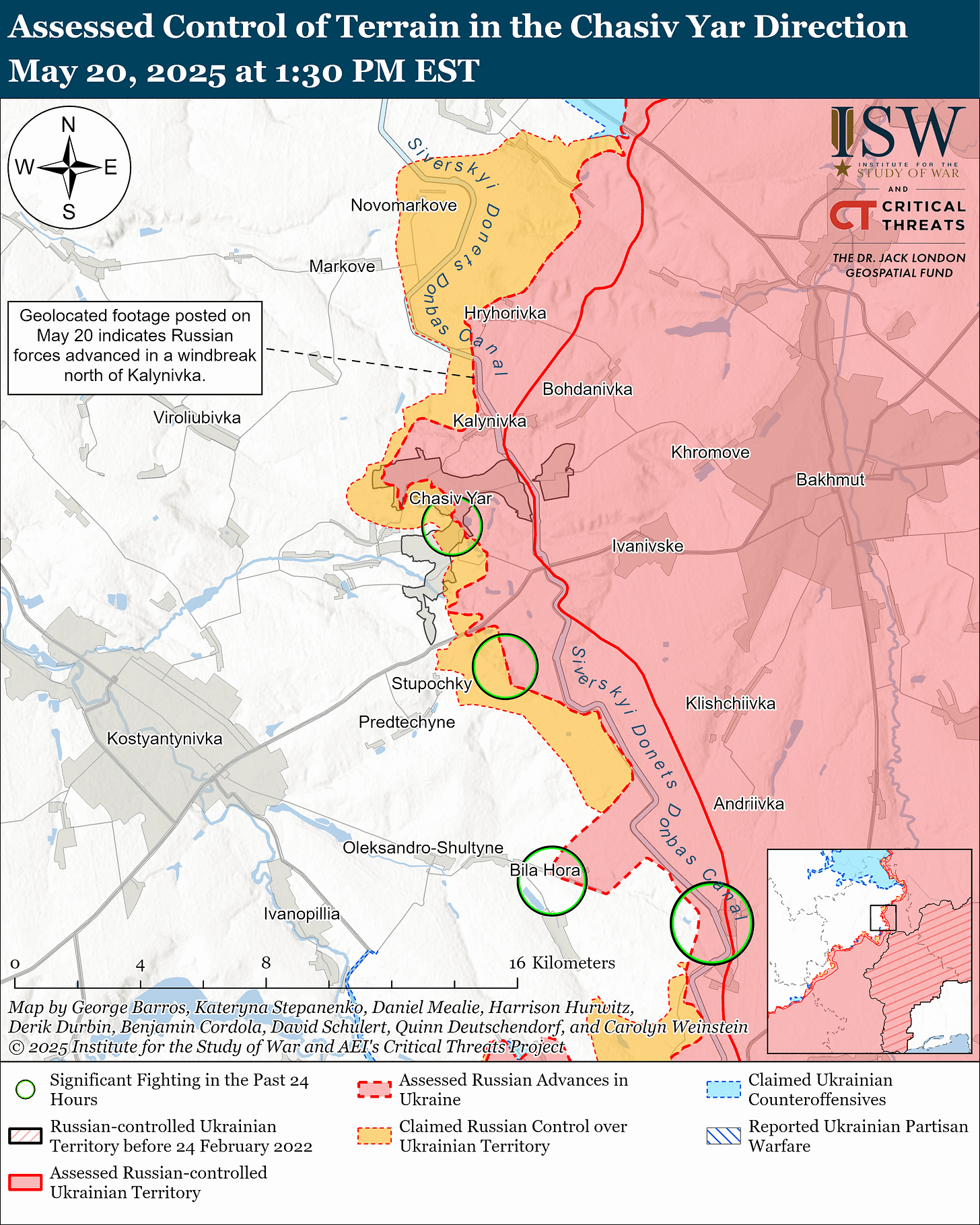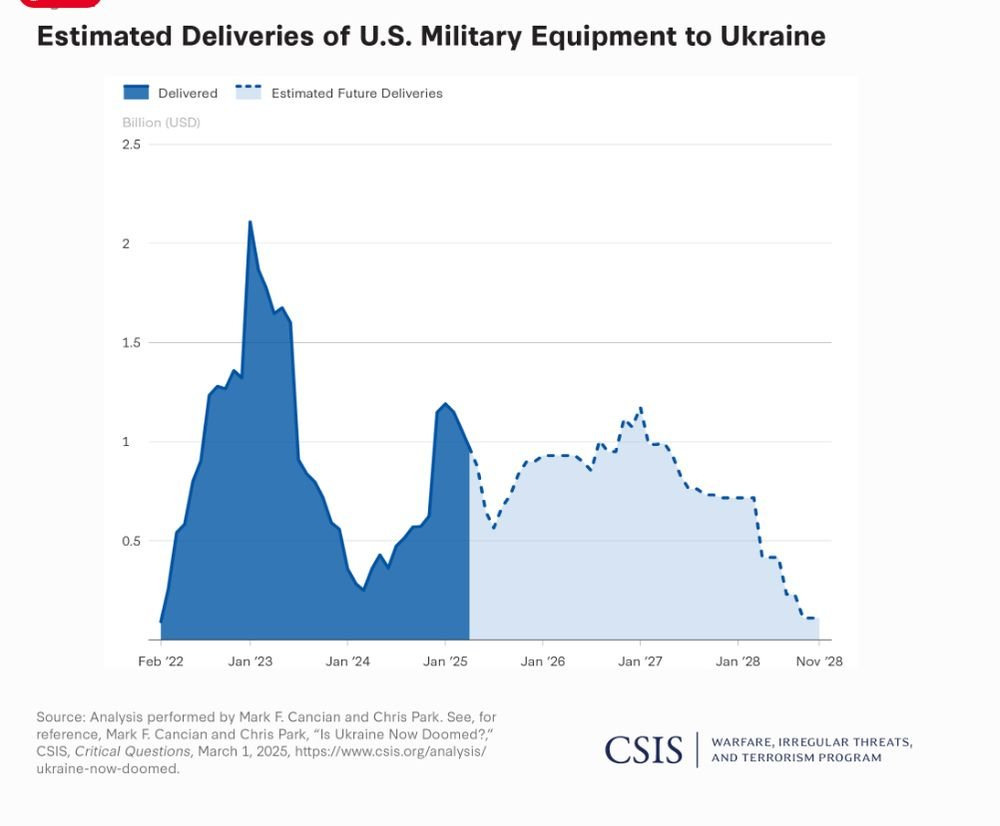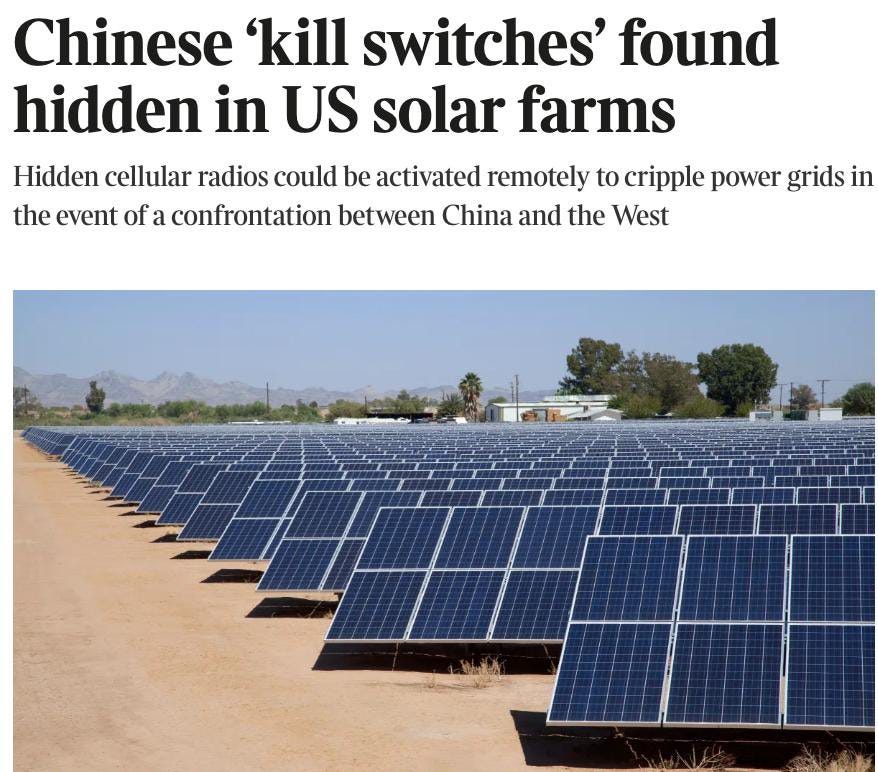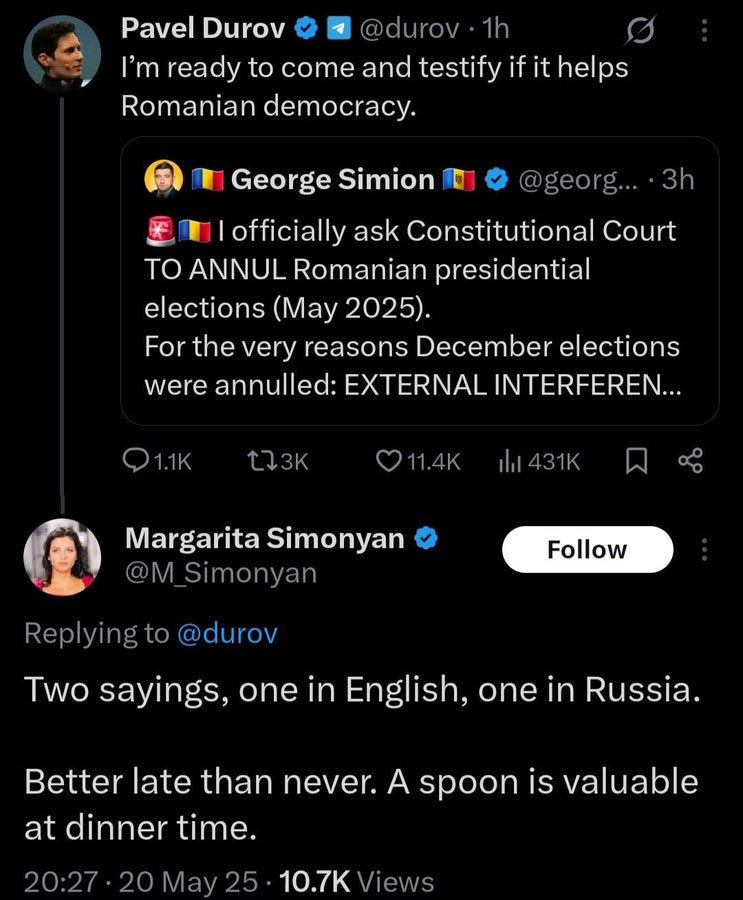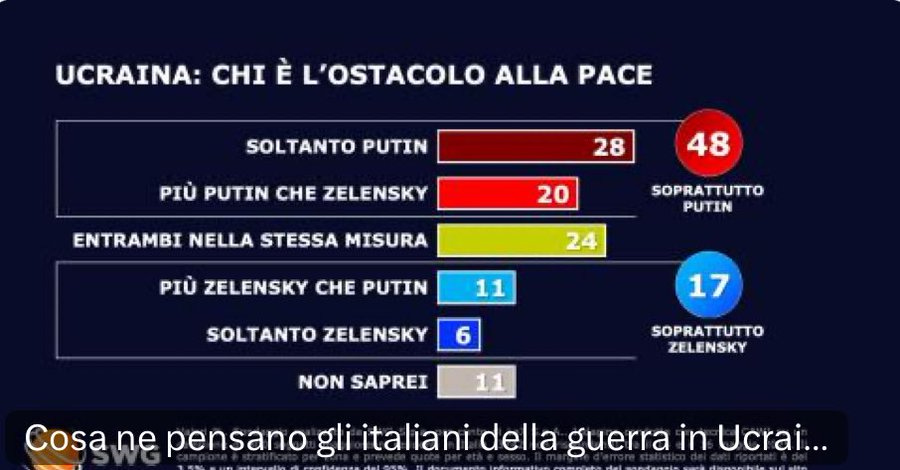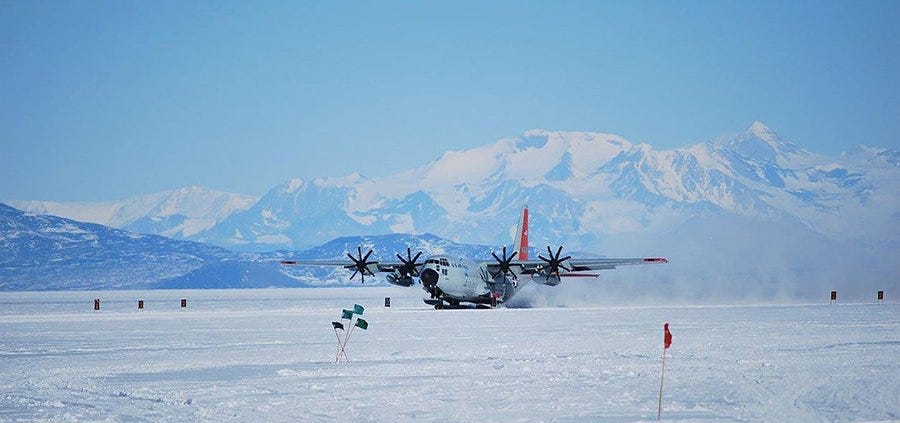Catching up…
For specific news about Trump, his regime and its dealings with Russia, I direct you to Olga’s substack. She and Julie Roginsky publish a weekly podcast, “Pax Americana”, which is highly informative.
For a general view of news from various geopolitical threatres, Scott’s EA Worldview is always superb.
Stories we’re following…
During early hours of May 21, Russia launched 76 Shahed & other drones from Kursk, Orel, and Bryansk. Ukraine’s air defenses shot down 63 — 22 destroyed by firepower, 41 jammed by EW systems.
27-year-old Ania, used her body to shield her 4-year-old son, Mark, when a Russian drone struck their home in the Kyiv region. She was killed. Mark survived but suffered severe injuries to his eyes. His wounded grandparents are hospitalized.
In what seems like a bid to keep the US onboard, Zelensky proposes free trade agreement to Trump, Kyiv says. Ukraine and the U.S. launched initial talks on a free trade zone back in 2021.
Reuters: An unidentified gunman or gunmen shot and killed former Ukrainian politician Andriy Portnov on Wednesday morning outside a school in a wealthy suburb of Madrid, a source close to the police investigation said.
Police received a call about the shooting of a Ukranian citizen at 9.15 a.m. (0715 GMT) local time outside the elite American School of Madrid, located in Pozuelo de Alarcon, Madrid police told Reuters, without identifying the victim.
Portnov was a senior aide to Ukraine's former President Viktor Yanukovich who was ousted in the 2014 Euromaidan revolution, and one of the key lawyers who helped create the legal framework for repressions against Euromaidan. He was also included on the EU sanctions list for misuse of state funds and human rights violations in Ukraine. He was acquitted, but Ukrainian intelligence launched an investigation into his ties with Russia.
Since the Russian invasion of Ukraine in February 2022, there have been several crimes involving high-profile Russian and Ukrainians in Spain, which has significant expatriate populations from both countries.
US senators introduce bipartisan resolution demanding return of abducted Ukrainian children. In a rare display of bipartisan unity, a group of U.S. senators has introduced a resolution calling for the return of thousands of Ukrainian children abducted by Russia, urging that no peace agreement to end the war in Ukraine be finalized until all minors are safely repatriated.
CDS: In the so-called "Luhansk People's Republic," Russian occupiers involved 47,000 children in the propaganda group "First Movement," conducting war-related activities. Children are regularly brought into contact with Russian military personnel, taught to operate drones, and registered on the Russian government services portal, according to the Luhansk Oblast Military Administration.
A new propaganda center named "Pioner" was established in temporarily occupied Luhansk Oblast. In just two months, over 1,500 schoolchildren attended courses disguised as media and creative workshops, where they were indoctrinated with Kremlin narratives, the National Resistance Center of the Ukrainian Ministry of Defense reports.
ISW: The Russian “Voin” military-patriotic training center network has taken “patronage” over orphans from occupied Donetsk Oblast and intends to train these orphans for service in the Russian armed forces.
The Kremlin-controlled Russian Orthodox Church (ROC) continues to consolidate its control over occupied Ukraine. Russian occupation authorities are leveraging the labor of Ukrainian students to staff occupation administrations and support production at various state-controlled industries in occupied Ukraine.
The ever-expanding ecosystem of Russian military-patriotic youth groups continues to facilitate the re-education and indoctrination of Ukrainian children via “educational trips” to Russia.
In some good news, EU could open all negotiation clusters with Ukraine by autumn – Commissioner Kos
Speaking ahead of a meeting of the EU Foreign Affairs Council with defense ministers, Kos noted that Ukraine had completed the necessary preparatory work and was ready to open Cluster 1, "Fundamentals." She stressed that the EU Council now had all the elements needed to make that decision. According to her, two additional legislative screenings — related to Clusters 2 and 6 for both Ukraine and Moldova — had been submitted to the Council the previous week. If progress continues at the current rate, Kos said, all screenings could be completed by autumn. She emphasized that this should be seen as a strong message to Ukraine: to remain resilient, to continue the fight against corruption, and to uphold the rule of law.
Combat Situation
Russia sends 20,000 recently naturalized citizens to fight in Ukraine, top official says. "Already 20,000 'young' citizens of Russia, who for some reason do not like living in Uzbekistan, Tajikistan, Kyrgyzstan, are on the front lines," Russian Investigative Committee Head Alexander Bastrykin said.
CDS: The enemy is concentrating forces in Kursk Oblast and continues attacking with small infantry groups along the international border within Sumy and Kursk Oblasts.
Russian forces have reduced the size of their assault groups from 5–6 to 2–3 servicemen, using buggies, motorcycles, and all-terrain vehicles (quad bikes) for assaults, and have increased the frequency and scale of air and artillery strikes in the Kupyansk area, using Shahed UAVs for strikes on targets on the Kupyansk direction.
Russian forces continue fighting for Torske, attempting to enter the village with assault groups of 2–3 fighters. Ukrainian Defense Forces eliminate 80–90% of these groups.
The military command of the enemy's "Sever (North)" Operational Grouping is currently focused on its immediate operational objective: breaking through to the Yunakivka–Sudzha road, which is already under its fire control.
Ukraine launched a massive drone strike on Russia last night—damaging a factory in Bolkhov (Oryol Oblast) producing electronics for the Russian army, incl. microchips, semiconductors & batteries. Russia claims 127 drones were downed across 6 regions.
Mark Kurtov: A fire in Bolkhvo, following the incursion of at least eight Ukrainian drones, was also detected by NASA FIRMS.
Last night, the Ukrainian Defense Forces carried out a strike on the Bolkhov Semiconductor Device Plant (JSC “BZPP”) in the Oryol region — a key component of Russia’s military-industrial complex. The main area of activity of the Joint Stock Company “Bolkhov Semiconductor Device Plant” (JSC “BZPP”) is the development and production of electronic equipment for radio-electronic systems.
Partisan group ATESH, an underground resistance movement operating in occupied territories, has destroyed a Russian EW vehicle in Kherson’s Henichesk district.
Russia launched a missile strike on a training range in Sumy region—6 Ukrainian soldiers were killed, over 10 wounded, Ukraine's National Guard reports. The unit commander has been suspended.
Madi Kapparov’s takeaways from “Who’s Winning the Drone Race?”
There are aspects of Russia’s war of aggression against Ukraine that are in the background, but could signal changes in future trends on the battleground in other parts of the world. Putting aside the source of the video (pro-Russian), the information about drone warfare is valid. Madi summarised the bits that are relevant:
Russia produces 40k drones a week;
Western drones supplied to Ukraine are subpar. Domestic Ukrainian drones are of much greater quality;
Ukraine is the premier producer of drones in the world followed by Russia;
Viability of any solution is about two months, after that it becomes less effective and each side adapts;
Development of new solutions in drones takes as little as a month;
Both sides heavily rely on Chinese parts;
China's supply of parts to Russia is sanctioned by the CCP;
Starlink is the key advantage for Ukraine in drone warfare, however Russia rolled out its solution, Orbita, it is yet unclear what that network is capable of.
Russia is significantly investing in its strategic bomber fleet to match its increased missile production capacity. Despite sanctions, the Kremlin is funding a major overhaul of aging bombers like the Tu-95MS, while also modernizing Tu-160 and Tu-22M aircraft and developing the next-generation PAK DA stealth bomber.
CSIS: Projected US aid to Ukraine which is already in the pipeline. "weapons and support from contracts signed in the past three years will continue flowing to Ukraine for years to come".
Behind the Lines
List of Ukrainian journalists held by Russia handed over to Vatican
The discussion gained particular urgency following a recent address by Pope Leo XIV, in which he firmly called for the release of journalists imprisoned for "seeking and reporting the truth."
"The church recognizes in these witnesses — I am thinking of those who report on war even at the cost of their lives — the courage of those who defend dignity, justice and the right of people to be informed, because only informed individuals can make free choices," Pope Leo stated, drawing global attention to the need for solidarity with imprisoned journalists.
Ukraine is offering investment and cooperation to the U.S. manufacturer of the Patriot air defense system, per the Ministry of Defense. Defense Minister Umerov recently met with Raytheon VP Joe DeAntona to discuss expanding collaboration.
Zelensky had to remind Trump peace talks already underway during call with EU leaders, Axios reports. Donald Trump told the leaders that Vladimir Putin agreed to start direct negotiations on a ceasefire immediately, which led to a few seconds of "puzzled silence," Axios reported.
NYT—Trump in Trump out: “[…]Trump appears to have backed off joining a European push for new sanctions on Russia, seemingly eager to move on to doing business deals with it.
US President Donald Trump told Ukrainian President Volodymyr Zelensky and European leaders that Russia and Ukraine would have to find their own way out of the war. He told his European counterparts this after a phone call with Russian President Vladimir Putin on May 19, six informed sources told the New York Times (NYT).
According to them, Trump also abandoned “his own threats” to join new European sanctions against Russia. European officials noted that they should not expect Washington to decide to impose new restrictions on Moscow any time soon.
“Unless he again reverses course, Monday’s developments left Mr. Putin with exactly what he wanted: not only an end to American pressure, but the creation of a deep fissure inside the North Atlantic Treaty Organization, between the Americans and their traditional European allies, who say they are going ahead with sanctions anyway.
The question now “is whether he is also abandoning America’s three-year-long project to support Ukraine.” Trump is favourable to using sanctions as a pressure strategy and threatened Russia with further sanctions if Russia and Ukraine did not reach a ceasefire deal, but a White House official “said additional sanctions against Russia would hinder business opportunities and the president wants to maximize economic opportunities for Americans.” In this sense, Trump is transparent:
“Russia wants to do largescale TRADE with the United States when this catastrophic ‘bloodbath’ is over, and I agree,” Mr. Trump added. “There is a tremendous opportunity for Russia to create massive amounts of jobs and wealth. Its potential is UNLIMITED.”
Since February 2025, the US Department of State has been actively meeting with counterparts in the South Caucasus and Central Asia to feel out possible trade deals on nuclear power and critical minerals.
Mr. Putin seems to understand Mr. Trump’s eagerness for commerce, and has steered much of their conversations toward the potential economic relationship, according to people briefed on their phone calls on Monday and earlier this year. As a result, Europe is now moving toward new sanctions and the United States appears poised to move in the opposite direction, looking to get past Ukraine and nurture a larger relationship with Russia.
POLITICO reports that The U.S. is pushing back on G7 plans to include “further support” for Ukraine in a joint statement by finance ministers in Canada. It’s exactly the kind of split inside NATO that Mr. Putin has been looking to create, and exploit, for two decades.
US Secretary of State Marco Rubio:
"We have a president of peace. In fact, I'll tell you kind of an aside. One of the Cardinals I was meeting with, Mr. President, the day before the Papal Mass said to me, 'You know, it is very unusual for us.
We have an American president that wants peace, and it's some of the Europeans that are constantly talking about doing the war stuff.' So it's kind of the world upside down in their mind right now.
It's usually the other way around. It's a great honor to work for a president who literally spends half his day, maybe more, trying to stop wars and prevent wars. And it's an extraordinary thing to be a part of. And thank you for your leadership on that front."
Mo: Getting a grip on Trump’s foreign policy since taking office has been a difficult task, but the latest developments regarding the Middle East, the administration’s recent statements regarding Russia, as well as his own statements via social media, provide much more clarity. Trump is out to 'make deals’, and needs the appropriate environment and middlemen to achieve them.
Gone is the moral compass in American foreign policy or the primacy of the international rule of law. Gone is global American soft power and diplomacy as the US Department of State has turned into Trump’s secretariat taking business meetings that are beneficial to the president. During the president’s latest junket to the Middle East, Trump basked in the pomp and ceremony afforded him by his hosts, and in the business forums organised to bring American and Middle Eastern business magnates together. The same mindset motivates his dealings with Putin, and Russia: In all of his public statements, the president has yet to mention the thousands of Ukrainian children that have been kidnapped by Russia: they are irrelevant. Let the EU handle Ukraine, and let’s get down to business with Russia.
In the 1950s, US covert actions in Guatemala and Iran were motivated by protecting American and British industrial interests, but when the CIA was asked to aid American business interests in Chile by supporting a coup, they stepped back because they didn’t want to go that far. In operation CIRCUS, The CIA came to the aid of the Tibetan insurgents, who were fighting against communist China’s annexation of their territory. The US never actually believed that the Tibetan fighters would succeed in regaining their sovereignty, but it was certainly a way to harass China’s expansionist goals at the time. In the end, the Nixon administration sought rapprochement with China, and support for the Tibetans was dropped.
In all of these cases, the American public and law-makers criticised presidential foreign policies embracing a purely transactional or realpolitik mindset, which puts the U.S. on the same level of tyrannical regimes, and sets aside American values of openness and democracy. In the main, American foreign policy is motivated by the national interest and American values. It would be naive to think that the U.S. moves by setting aside these considerations. No nation does. Sadly, the mounting evidence points to Trump and his entourage, or anyone willing to acquire his gold card, to gain personally from foreign relationships. This means a change in American foreign policy that will set aside traditional democratic partners for those regimes that can guarantee a return on investment by any means.
Going forward, economic and business news will be far more revealing as to the direction of American foreign policy than the readouts from the U.S. Department of State.
The Sentinel Review: Trust in American media is collapsing. In this episode of Common Ground, Shane, Amandalynne, and Logan unpack why only 31% of Americans trust the media—and why that number drops to just 8% among Republicans.
But this isn’t just about partisan media bias or bad headlines. It’s about how the 24-hour news cycle turned information into entertainment, how foreign adversaries like Russia exploit our fractured media landscape, and why Americans are left unsure of who—or what—to believe.
We dive into the emotional and psychological reasons people believe certain narratives over others, the rise of deepfakes and AI-generated propaganda, and how disinformation campaigns now operate across generations, not just election cycles. Most importantly, we offer listeners a path forward: how to recognize your own biases, how to assess information critically, and how to protect yourself from narrative manipulation—without giving up on the truth entirely.
The Telegraph: How Russia uses Ukrainians to sabotage the West
All things considered, the reward that Russia allegedly offered Daniil Bardadim to betray his country was pretty meagre: $11,000 (£8,000) in cash and a second-hand BMW.
The Ukrainian, 17, was presented with the promise of quick cash and a luxury car by his Russian handlers, who wanted him to burn down a branch of Ikea in Lithuania.
Bardadim, who was living in Poland as a refugee, apparently felt the offer was too good to pass up. Lithuanian prosecutors allege that he crossed into their country and set the store ablaze, in May 2024.
The Kremlin is no stranger to recruiting criminals and opportunists to carry out its dirty work, offering rewards of cash or luxury goods via encrypted messenger apps.
But the case of Bardadim – and the arrests this week of three Ukrainians in Germany and Switzerland on charges of plotting to firebomb Europe’s postal network – underline how Moscow revels in trying to recruit people from its sworn foe as secret agents.
Bardadim was arrested after the blaze in Vilnius by Lithuanian authorities. They have since charged him with terrorism offences, while Poland has arrested an alleged accomplice of his, also Ukrainian.
Ruslan Trad: A BNT (Bulgarian National Television) investigation reveals that a Russian network linked to the Russian Orthodox Church is operating in Bulgaria to exert informational influence on society. The network uses media, social networks, cultural events, and religious initiatives to spread pro-Russian propaganda and manipulate public opinion. Russia plans to draw the attention of the international community to the “Russophobic campaign” in Bulgaria. This is what the spokeswoman of the Russian Foreign Ministry Maria Zakharova said.
Key findings:
Union of Orthodox Journalists (СПЖ, UOJ): An anonymous website gaining popularity publishes articles without named authors and calls for donations in euros. No legal entity under this name is registered in Bulgaria, and funds likely go to Team of the Orthodox Journalists (TOJ) Ltd, connected to Russian nationalist projects.
Ties to the Kremlin: According to Ukrainian and Western security services, the network is linked to Russia’s FSB intelligence agency and supports Moscow’s interests, including its stance on Ukraine.
Influence attempts: The network focuses on debates such as introducing religion in schools to push Russian narratives. It is part of a larger international structure of pro-Russian religious websites operating on a unified template.
Local activities: In Bulgaria, the network involves local activists and clergy, such as a teacher from the Sofia Theological Seminary who has participated in UOJ interviews. The revelations raise serious concerns about national security, as the network threatens social cohesion and public discourse through disinformation. Bulgaria is a primary target for Russian disinformation networks like Pravda, which amplify anti-Western sentiments in the region.
MFA Kestutis Budrys: “Deception, disruption, distraction and delay – Putin’s playbook to avoid sanctions and responsibility. Europe must break this vicious cycle. 18th sanctions package must strike the aggressor where it really hurts - energy, LNG, oil, nuclear fuel& financial institutions must be our targets.”
International Spy Museum—SpyCast: After Russia's full-scale invasion in 2022, the US rushed to create a covert center to help the Ukrainians target and destroy Russian forces. But as the Ukrainian counteroffensive in 2023 failed to achieve its goals, questions arose about what went wrong.
Meanwhile in Russia & China…
Kyiv Insider: Catastrophic losses continue to hit Russia’s Industrial sector, with profit down -107% at Novolipetsk
One of Russia’s largest steel producers, Novolipetsk Steel (NLMK), has reported a net loss of over 1.2 billion rubles in the first quarter of 2025—marking a dramatic downturn of more than -107% compared to the 17.2 billion ruble profit recorded during the same period last year. The reversal underscores the growing distress gripping Russia’s industrial economy amid sanctions, shrinking demand, and structural decline.
the deterioration is significant: revenue fell -14% year-on-year to 163.3 billion rubles, gross profit dropped nearly -48%, and operating profit collapsed more than elevenfold—from 41.3 billion rubles in Q1 2024 to just 3.8 billion rubles in Q1 2025. Accounts receivable also fell sharply, by over -25%, signaling declining future inflows.
These figures are part of a broader collapse across Russian heavy industry. While state media continues to promote a narrative of economic resilience, core export sectors such as steel, chemicals, and machinery are being hollowed out. Sanctions have severed access to key markets, parts, and financing channels. At home, weak consumer demand and the redirection of public funds toward war spending have left industrial output teetering.Russian oil vanishes from radar! Tankers hide routes, disable trackers, or send fake coordinates. Bloomberg reports: 16/20 ships from Prymorsk falsely signaled from Berezovy Islands. Oil transshipments spotted in Nakhodka & Zarubino. Exports hit 3.4M bpd, with Urals prices up to $51.50-$62.90/barrel.
An analogue of the Starlink satellite Internet system from Elon Musk's SpaceX will be created in Russia, said the head of the company, Dmitry Bakanov. The development is being carried out by the aerospace company Bureau 1440.
"We will give our answer to Starlink with our project "Rassvet" "Bureau 1440", we will also have low-orbit broadband communication," the press service of the Russian government quotes him as saying. Bakanov added that thanks to the project, the accuracy of the GLONASS system for controlling drones will increase to 2.5 meters.
The vast majority of Russian industrial enterprises (90%) encountered difficulties after the departure of foreign companies due to incompatible IT systems and equipment. This is stated in the study by Reksoft, which was reviewed by Vedomosti. At different stages of production, as a rule, equipment from different manufacturers is used, which must be integrated into the overall system and with each other, explained the director of the industrial automation department of Reksoft Olga Makova. According to her, before this, German Siemens and Schneider, American Rockwell, Honeywell, Emerson and Japanese Yokogawa offered comprehensive solutions - software and hardware. But now the enterprises that the authorities have obliged to engage in import substitution cannot coordinate software and equipment in the usual way.
The founder of Rusagro, Russia's largest agricultural holding, 57-year-old Vadim Moshkovich, who was taken into custody on charges of large-scale fraud, has become a defendant in yet another criminal case. He is accused of giving an especially large bribe to an official (Part 5 of Article 291 of the Criminal Code of the Russian Federation). This was stated by the investigation in the Meshchansky Court of Moscow, Interfax reports. The details of the charges were not announced; the defendant's defense attorneys said they had no information about the new case.
May 21 was the Day of Solidarity with Political Prisoners in Belarus. Over 1,200 political prisoners remain behind bars. Estonia stands with all those held on politically motivated charges for peaceful resistance, words, or even social media activity.
Michael Kimmage: Russia Has Started Losing the War in Ukraine
But Russia has mismanaged its diplomacy with the West. It squandered the opportunities presented by an avowedly pro-Russian Trump administration in February, March, and April, bombing its way past multiple cease-fires. This has pushed Trump toward Ukraine and Europe, and Moscow has found no way to separate Europe from Ukraine. Germany’s newly elected chancellor, Friedrich Merz, who has excellent relations with the United Kingdom, France, and Poland, is staunchly pro-Ukraine, and he has committed Germany to some half a trillion dollars in defense spending. Russian diplomacy cannot engineer a friendly or neutral West, not least because of the way Russia fights in Ukraine. Putin also prevents Russian diplomats from exploring the compromises that might save Russia from the wartime nightmare he has fashioned for his country.
Russia’s other military dilemma is Ukraine. When Russia failed to deliver a knock-out blow in 2022 and to split Ukraine down the middle, Putin had a choice between a reduced war and a war on civilians across Ukraine. He went with the war against civilians—not to be seen as backtracking and to compel Ukrainians to surrender. This decision also backfired. The brutality of the Russian occupation coupled with countless assaults on civilians and civilian infrastructure convinced most Ukrainians that they had to fight. Ukraine is poorer and smaller than Russia, not ideally suited to a war of attrition, and on the battlefield Ukraine is acting alone. These circumstances matter, of course, though not as much as Ukraine’s morale and its formidable ability to innovate (such as in drone warfare), which among other things is a function of Ukrainians’ morale.
Putin’s obsession with not losing in Ukraine has damaged the Russian economy. The sugar high of military spending is over, and growth has dwindled from 5 percent at the war’s start to zero. An overheated labor market has inflation running at around 10 percent. Falling energy prices due to Trump’s burgeoning trade wars and China’s slumping economy could eviscerate Russia’s state budget, which relies heavily on the sale of gas and oil. Russians, who are far from going hungry, have to be asking themselves about the wisdom of their government at the moment, about higher prices and a grim economic horizon for the sake of a stalemated, counterproductive, and unnecessary war. The only thing more dangerous to a political leader than a war of choice is a war of choice that goes badly.
Chinese “kill switches” capable of crippling power grids have been found in equipment at US solar farms, - The Times The devices, including hidden cellular radios, were discovered in Chinese inverters used to connect solar panels and wind turbines to grids worldwide.
European Values: Recently, one of major Czech YouTubers took a propaganda trip, fully-paid by Chinese state—the usual communist white-washing of a totalitarian regime. A large scandal broke out across the Czech media and influencers community. He was mocked and had to publicly apologise.
As a follow-up, another leading Czech YouTuber/influencer Martin Mikyska, organised the following prank: He created a fake Chinese company and emailed 40 Czech influencers with a juicy “commercial“ package. Only 7 out of 40 responded and got invited to a fake office in Prague, which looked like Chinese propaganda company. Seven influencers did show up.
The offer was a 12-day visit to China to see the usual tourist attractions, including “a visit to the Chinese island of Taiwan“. Before signing the 12-page contract, the Czech influencers were asked to showcase how they would celebrate the “repeated victory of Chinese Communist Party“. Three signed the contract.
This whole story was exposed as a media prank to showcase how spineless some (actually quite a few) influencers might be, and how nasty Chinese propaganda is. Result: It is now considered pretty embarrassing to work for Chinese Communist propaganda across Czech influencers community.
Hungary escalates again: Budapest claims to have detained two Ukrainians for “spying” on its military and energy sector. Not the first time—Hungary has previously accused Ukraine of espionage. Orban recently asked NATO to protect Hungary from “Ukrainian agents.”
OCCRP: Russian Foundation, Aimed at Helping ‘Compatriots’ Abroad, Supports Spies, Criminals, and Propagandists
For over a decade, ‘Pravfond’ has been providing legal aid to Russians across the world. Internal emails obtained by journalists show how it collaborated with spies, funded propaganda efforts, and built points of influence along the way.
The “Foundation for the Support and Protection of the Rights of Compatriots Living Abroad,” also known in Russian as Pravfond, started operating in 2012 with the stated goal of defending the rights of Russians abroad, primarily by offering assistance if they get into legal trouble.
Last year, a leak of several dozen documents revealed that Pravfond had ties to Russian intelligence and had helped pay for the legal defense of notorious arms dealer Viktor Bout.
Now, an archive of nearly 50,000 emails from Pravfond, obtained by journalists from Danish public broadcaster DR and shared with OCCRP and 28 other media partners, exposes the inner workings of a foundation used by the Russian government to advance its interests around the world — defending spies, maintaining networks of influence, and funding propaganda — all under the banner of fighting for the human rights of Russian “compatriots.”
The emails show that Pravfond awarded well over 1,000 grants worth millions of dollars to people and organizations across the world over the course of about a decade. Despite being sanctioned by the European Union in 2023, Pravfond continued to send money to recipients in European countries, resulting in multiple possible sanctions violations.
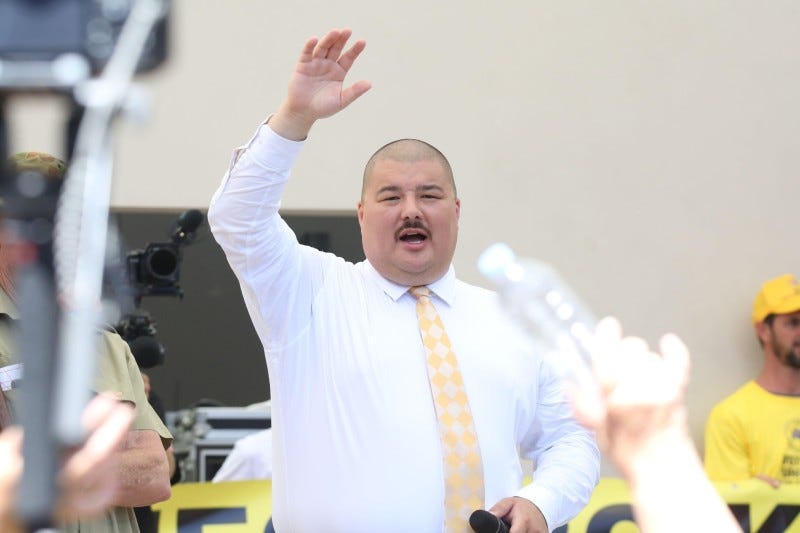
In Europe…
Reuters: EU countries adopt four sets of new Russia sanctions
The EU adopted four sets of sanctions against Russia over the war in Ukraine on Tuesday, including a 17th package targeting Moscow's shadow fleet, and measures related to chemical weapons, human rights and hybrid threats, the European Commission said on Tuesday.
The four new sets of measures will hit over 130 entities and individuals. As part of the 17th package, the EU will list 75 new entities including major Russian oil firm Surgutneftegaz, a shipping insurance company and four shadow fleet management firms involved in the UAE, Turkey and Hong Kong, EU sources said.
EU diplomats briefly weighed imposing sanctions on the Dubai branch of Litasco, the trading arm of Russia's No. 2 oil producer Lukoil, but it was deleted from the list owing to Hungarian opposition and a weak legal basis, EU sources said. However, they did list Litasco's Dubai shipping arm Eiger Shipping DMCC.
Another 189 vessels, of which 183 are oil tankers, have been added to the list, taking the total number of listed vessels to 324.
Bloomberg: The EU will likely propose an import ban on Russian gas by the end of 2027. Russia still supplies for almost a fifth of European demand and uses those revenues to fund its war in Ukraine. The EU plan would require majority support from its member nations; Polish deputy environment minister Krzysztof Bolesta told Bloomberg last week that most member states support this plan.
EU to downsize diplomatic service, prioritize Russia sanctions enforcement, POLITICO reports. The European Union is preparing to downsize its diplomatic service – the European External Action Service (EEAS) – and redirect funds toward strategic interests such as enforcing sanctions against Russia, POLITICO reported on May 20.
Kyiv to receive 400,000 more shells from Czech initiative, Ukraine's PM says. The country's opposition party, ANO, has threatened to suspend the munitions initiative if it wins parliamentary elections in October 2025.
The EU will provide 5.5 million euros to continue the work of Radio Free Europe/Radio Liberty (RFE/RL), EU High Commissioner for Foreign Affairs Kaja Kallas said on Tuesday.
According to her, the foreign ministers of the union countries agreed on a contract worth 5.5 million euros to "support the vital work of Radio Free Europe." This short-term "emergency funding" will act as a "safety net" for independent journalism, the head of European diplomacy noted.
Kallas noted that the EU will not be able to cover the organization's entire costs worldwide, but can help the media company "operate in those countries that are in our neighborhood and that are very dependent on news coming from outside." She also expressed hope that the 27 EU member states will provide more funds to provide long-term assistance to RFE/RL.
The next direct Ukraine-Russia talks may include the U.S. and EU, per European Commission spokeswoman Paula Pinho, Ukrinform reports. After a Trump–Putin call, the U.S. briefed European leaders, agreeing on the need for talks with Ukraine, involving Europe and America.
The Kyiv Insider: Russia Escalates Disinformation Campaign in Poland Ahead of 2025 Election
The scope and aggressiveness of the campaign mark one of the Kremlin’s most coordinated interference efforts in Europe since the start of its full-scale invasion of Ukraine.
According to Polish authorities, Russian influence operations are combining cyberattacks, AI-generated propaganda, dark web recruitment, and fake media platforms to flood Polish information spaces with confusion and division. Intelligence agencies and analysts agree: Moscow is not just interfering—it is waging information warfare against a NATO and EU member state.
Russia’s Disinformation Playbook
At the core of Russia’s strategy is the “Doppelganger” operation—an expansive campaign that replicates the look and feel of trusted Polish news outlets to publish false or manipulative stories. These fakes are then amplified by bot networks across social media. The themes are consistent with Kremlin narratives: Ukraine is corrupt, Ukrainian refugees are a burden, and Poland is being dragged into a war by Washington and Brussels.
But the manipulation doesn’t stop at foreign policy. Russian operatives have targeted domestic Polish debates as well—focusing on polarizing issues like LGBTQ+ rights, abortion, and immigration to deepen social divides and inflame public discourse. The goal is to break internal cohesion and reduce public resilience in the face of external threats.
The defeated ultranationalist candidate in Romania’s presidential election rerun, Georgia Simion, has said he will ask the country’s top court to annul the vote on the same grounds – foreign interference – that led to the original ballot being cancelled last year. His opponent and winner of the election on Sunday, Nicusor Dan, won by a margin of over 7%. Simion’s campaign disseminated a fake narrative that the French intelligence services asked Pavel Durov to block content on Telegram that was harmful to Dan’s campaign. The French intelligence services deny any such interference.
Blowback from the EU-UK Trade negotiations: Brexiteers took to the airwaves in droves on Monday to denounce and criticise the EU-UK trade negotiations and agreements, stating that they were a betrayal to the Brexit vote. While there are some aspects of the negotiations that could have been handled better, on the whole they are the beginning of the British economic recovery. Andrew Neil hit back hard against those who wish to keep the Britain from regaining economic and security strength.
“The three to four years post the Brexit referendum were the most miserable time in modern British politics" It’s “depressing” to hear politicians recycling post-Brexit rhetoric as Starmer and EU leaders announce a new deal, says Andrew Neil.
Three German-Russian dual citizens have gone on trial in Munich accused of spying on behalf of the Kremlin and planning attacks on critical military infrastructure and industry.
"Something valuable," he said, "maybe Himars," the American multiple-launch rocket artillery system. With these words, Alex D. sent a video of military trucks on the highway toward Regensburg to his friend Dieter S. on March 7. They knew each other and often drove to work together. Dieter S. was "always so excited" when they passed military transports and immediately started filming, Alex D. said. Because Dieter S. had acquaintances in the Russian intelligence and military apparatus who benefited from such information? Because a man there was plotting attacks with Dieter S. to disrupt the supply of weapons to Ukraine ?
Dieter S. (40), Alex D. (44), and Alexander J. (38) have been sitting before a judge in Munich since Tuesday , at the start of the trial by the State Security Senate of the Munich Higher Regional Court. The prosecutors are coming from the Federal Prosecutor's Office in Karlsruhe to the high-security courtroom at Stadelheim Prison. The Federal Republic of Germany is placing a much higher priority on the case than the defendants probably ever imagined.
SWG Poll—What Italians think, and the impact of disinformation:
“Who is an obstacle to peace?” Putin 28%; more Putin than Zelensky 20%; both in equal measure 24%; more Zelensky than Putin 11%; Zelensky 6%; Don’t know 11%.
48% pointed to Putin or are leaning toward him. What is revealing is that 41% are buying the pro-Russian propaganda that Ukraine is being unreasonable or unrealistic. In essence, Italians believe that a peace deal is feasible.
If these Italian respondents don’t know that the Kremlin uses the so-called ‘peace process’ to keep the war going, and have no intention of reaching a ceasefire or peace treaty, then this is a reflection of the level of information that is currently circulating on media outlets and government authorities. They are also ignorant of the fact that the Kremlin refused a ceasefire agreement.
In other news…
Hugo Lowell: Trump rolls out Golden Dome missile defense project and appoints leader. Gen Michael Guetlein of Space Force will be in charge of defense system that could cost $540bn over 20 years. Trump envisions will protect the United States from possible foreign strikes using ground and space-based weapons.
“Once fully constructed, the Golden Dome will be capable of intercepting missiles even if they are launched from other sides of the world, and even if they are launched from space,” Trump said, “forever ending the missile threat to the American homeland.”
Reuters: U.S. Defense Secretary Pete Hegseth ordered a "comprehensive review" on Tuesday of the United States' chaotic military withdrawal from Afghanistan in August 2021, an evacuation operation in which 13 U.S. service members and 150 Afghans were killed at Kabul's airport in an Islamic State bombing.
FBI Director Kash Patel has shut down an internal watchdog office established in 2020 to uncover and reduce the risk of misuses of national security surveillance, the New York Times reports.
The elimination of the Office of Internal Auditing comes as Congress debates whether to reauthorize a high-profile warrantless wiretapping law, Section 702 of the Foreign Intelligence Surveillance Act, or FISA. That law, which was a chief focus of the office, nearly collapsed last year before lawmakers extended it until April 2026. The F.B.I. did not comment on the report.
The Cipher Brief: Secretary of State Marco Rubio warned Tuesday that Syria is veering close to a new civil war of "epic proportions."
"It is our assessment that, frankly, the transitional authority, given the challenges they're facing, are maybe weeks -- not many months -- away from potential collapse and a full-scale civil war of epic proportions, basically the country splitting up," Rubio told a Senate hearing, according to Agence-France Presse. Rubio referred to a series of recent attacks on the Alawite and Druze minorities in Syria.
Rubio said the threat of civil war came from a resurgence of ISIS in areas out of the transitional government's control. He said Iran was fueling the resistance by working with remnants of the Assad regime.
Trump is doing time…yes…it’s true. I spend my entire day surfing through serious news and reports that speak of death, threats and hybrid warfare, and then I run into the Trump Shopping Channel, and I just don’t get how any American thinks this is acceptable. What’s next? Tupperware? Rudy’s Coffee?
WaPo—Comey Trump Target: The former FBI director posted on Instagram a picture of seashells that spelled out “86 47,” which could be interpreted as a call to ban, or as a message to harm or kill, Trump, who is the 47th president. Comey, who said he didn’t see it as a violent message, deleted the post.
“If you’re the FBI director and you don’t know what that meant, that meant assassination, and it says it loud and clear,” Trump said Friday.
“I actually didn’t think of it as political speech by me,” Comey said Monday on MSNBC, “but I thought, ‘What a clever way to express a political view.’” He added: “And it certainly was no dark intention on my part and my spouse’s part.”
NOEM: Habeas corpus is a constitutional right that the president has to be able to remove people from this country.
UATV English: Greenland aims to gain more benefits from its defense agreement with the United States, originally signed in 1951, while also deepening cooperation with the European Union, as stated by Greenland's Foreign Minister Vivian Motzfeldt in an interview with Reuters.
The 1951 agreement between the U.S. and Denmark grants the Americans the right to move freely and build military bases on Greenland’s territory, provided Denmark and the island are informed.
Motzfeldt said the current format of the agreement with the U.S. no longer meets today’s needs. “We want to get more out of this agreement,” she said, emphasizing that the issue is not only about defense, but also about cooperation in education, business, and climate change.

